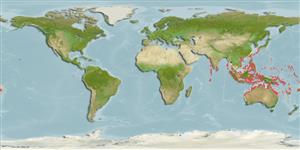Teleostei (teleosts) >
Eupercaria/misc (Various families in series Eupercaria) >
Labridae (Wrasses) > Corinae
Etymology: Thalassoma: Greek, thalassa = the sea + Greek, soma = body; the colour of the sea (Ref. 45335).
More on author: Bleeker.
Environment: milieu / climate zone / depth range / distribution range
Ecology
Marine; reef-associated; non-migratory; depth range 1 - 15 m (Ref. 1602), usually 1 - 12 m (Ref. 27115). Tropical; 24°C - 28°C (Ref. 27115); 35°N - 47°S, 70°E - 175°W
Indo-West Pacific: Maldives to Fiji, north to southern Japan, south to Lord Howe Island.
Size / Weight / Age
Maturity: Lm ? range ? - ? cm
Max length : 20.0 cm TL male/unsexed; (Ref. 9710)
Dorsal spines (total): 8; Dorsal soft rays (total): 13; Anal spines: 3; Anal soft rays: 11. Color pattern remains similar throughout life. Large juveniles and females are mostly black with a single white band and white area below the head to the anus. Males retain the white central band but is more yellow, and develops a second narrow band halfway towards the head (Ref. 48636). Initial phase white with 3 black bars, the first on upper half of head and anterior body containing a yellow streak at edge of opercle, the second across dorsal fin and ventrally to anus, the third covering most of body and posterior portions of dorsal and anal fins. Terminal male with yellow between black bars. Pectoral fins bluish (Ref 9823).
Occurs in groups (Ref. 90102) in exposed crests of seaward and lagoon reefs, usually rock-based. Minimum depth reported from Ref. 27115. Replaced by T. nigrofascatum in Papua New Guinea (Ref. 90102).
Life cycle and mating behavior
Maturities | Reproduction | Spawnings | Egg(s) | Fecundities | Larvae
Oviparous, distinct pairing during breeding (Ref. 205).
Randall, J.E., G.R. Allen and R.C. Steene, 1990. Fishes of the Great Barrier Reef and Coral Sea. University of Hawaii Press, Honolulu, Hawaii. 506 p. (Ref. 2334)
IUCN Red List Status (Ref. 130435)
Threat to humans
Harmless
Human uses
Fisheries: commercial; aquarium: commercial
Tools
Special reports
Download XML
Internet sources
Estimates based on models
Preferred temperature (Ref.
123201): 23.6 - 29.3, mean 28.6 °C (based on 2503 cells).
Phylogenetic diversity index (Ref.
82804): PD
50 = 0.5000 [Uniqueness, from 0.5 = low to 2.0 = high].
Bayesian length-weight: a=0.00955 (0.00430 - 0.02123), b=3.06 (2.89 - 3.23), in cm total length, based on LWR estimates for this Genus-body shape (Ref.
93245).
Trophic level (Ref.
69278): 3.1 ±0.2 se; based on diet studies.
Resilience (Ref.
120179): Medium, minimum population doubling time 1.4 - 4.4 years (Preliminary K or Fecundity.).
Fishing Vulnerability (Ref.
59153): Low vulnerability (10 of 100).
Nutrients (Ref.
124155): Calcium = 77.9 [45.6, 128.6] mg/100g; Iron = 0.684 [0.398, 1.279] mg/100g; Protein = 18.4 [15.5, 20.6] %; Omega3 = 0.133 [0.085, 0.204] g/100g; Selenium = 21.7 [13.3, 38.4] μg/100g; VitaminA = 126 [39, 461] μg/100g; Zinc = 1.74 [1.23, 2.83] mg/100g (wet weight);
